The best places in the US to experience totality during the April 2024 solar eclipse
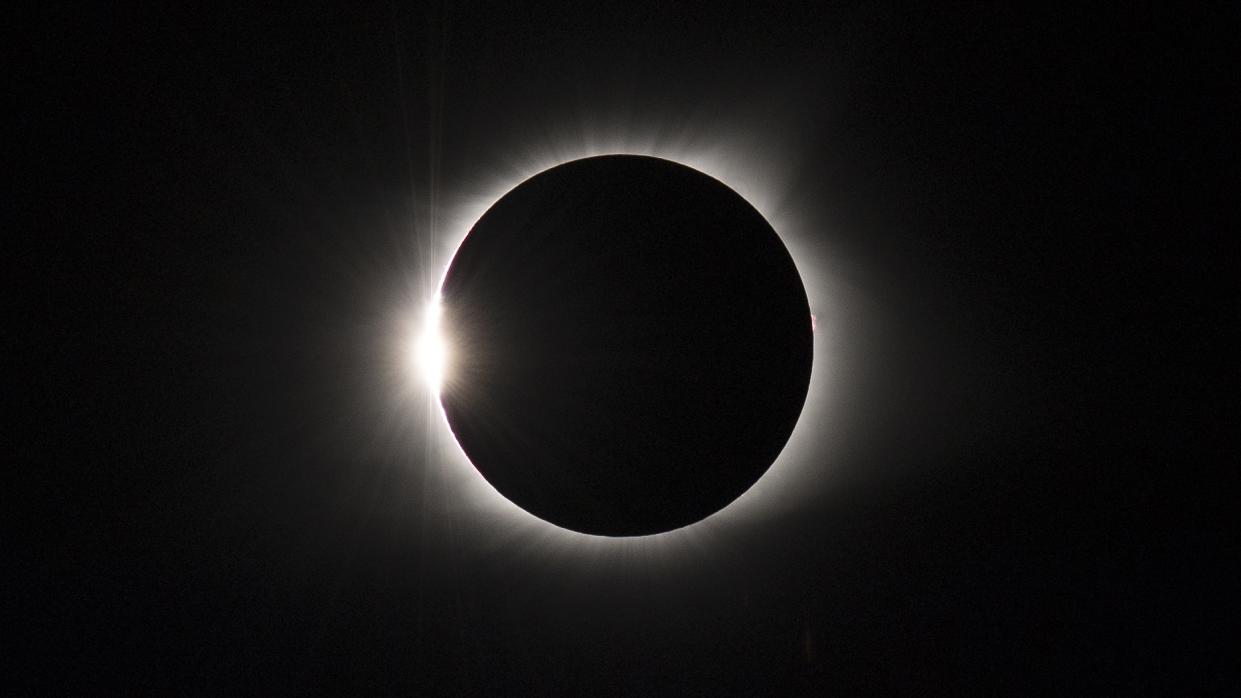
The total solar eclipse 2024 is fast approaching and will be visible across Northern America on April, 8.
During the brief moment of totality, the moon moves in front of the sun to cause daytime darkness and a chance to see the sun's corona. The last time that happened in the U.S. was on August 21, 2017, and memories are fresh.
Seven years ago, the path of totality was relatively remote. This time, it will pass by some vast cities and metropolitan areas, ranging northeast from Texas through Maine. Only from within this path will it be possible to witness totality for up to 4 minutes and 26 seconds.
If you cannot catch the event in person you can watch the action unfold on Space.com with our eclipse live updates blog and eclipse livestreams.
Related: How will the 2024 total solar eclipse differ from the 2017 total solar eclipse?
For each U.S. state, where the path of totality intercepts, we've included three of the best places to observe from. These recommendations come from a variety of sources, including data on the longest possible duration of totality in that state, places on or near the centerline, climate data on where is most likely to have a clear sky, choice scenic spots, areas that could be quiet, but also organized events. We've not included information for Kentucky, Tennessee or Michigan because the path of totality only enters a tiny portion of these three states.
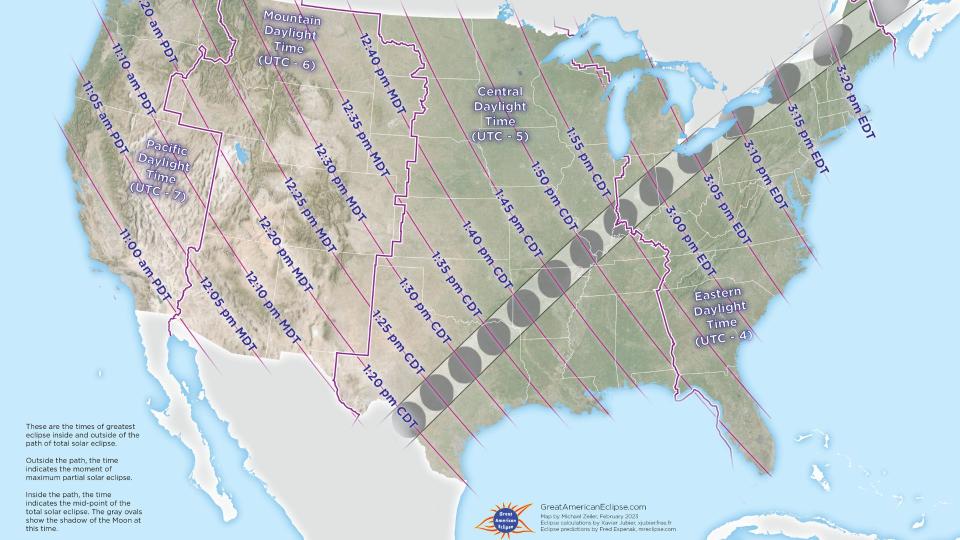
Are you lost when it comes to eclipse maps?
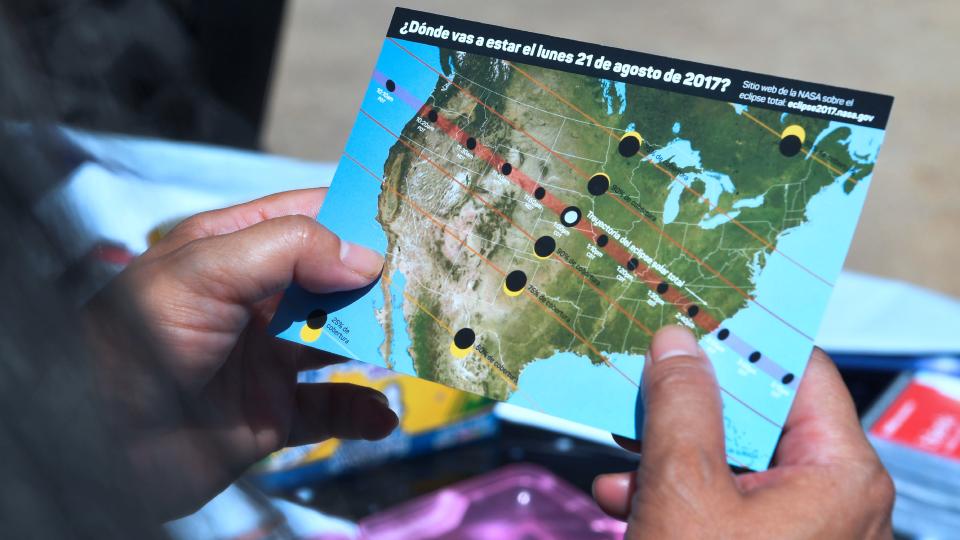
Our how to read and understand a solar eclipse map will help you get the most out of your eclipse viewing venture!
However, remember that the best observing location is wherever it's clear in the path of totality. "If you have the luxury of being able to travel at the last minute, what I highly recommend is to check the weather a few days before," Tyler Nordgren, an Ithaca, New York-based astronomer and eclipse artist at Space Art Travel Bureau told Space.com. "Weather models tend to solidify about three days out, so around April 1 and certainly by April 5, look at the weather models and go to wherever is clear the path in totality." If you don't have that luxury, pick someplace in the path of totality that you'd like to go to, regardless of whether or not a total solar eclipse is about to occur. "Go somewhere you've always wanted to visit — that way, you won't be disappointed — but, really, just go wherever you can get to in the path of totality," said Nordgren.
Related stories:
— Solar maximum: Why April's total Solar Eclipse will bring unique views of the sun's corona
— Total solar eclipse April 2024: 8 top tips for planning your trip
REMEMBER to NEVER look at the sun directly. To safely view this solar eclipse, you must always use solar filters. Only during the exact moment of totality, when the sun's disk is 100% blocked by the moon, can you look with the naked eye. This is possible only within the path of totality and only for a few minutes, depending on your location. At all other times, precautions must be taken. Observers must wear certified solar eclipse glasses, and cameras, telescopes and binoculars must have solar filters placed in front of their lenses. For more information on solar viewing safety, check out our guide on how to observe the sun safely.
Texas
Radar Base (1:27 p.m. CDT, 4 minutes, 26 seconds): the first location to experience totality in the U.S. and for the longest time.
Texclipse Music Festival, Junction (1:34 p.m. CDT, 3 minutes, 10 seconds): the best climatological prospects for a clear sky in the U.S. according to the meteorologist Jay Anderson.
Ground Zero Music Festival, Bandera (1:31 p.m. CDT, 4 minutes, 9 seconds): 20 bands, a full cowboy rodeo, stunt shows and a car and truck show. Could it be any more Texan?
Oklahoma
Beavers Bend State Park, Hochatown (1:46 p.m. CDT; 4 minutes, 13 seconds): hiking, biking, and fishing on the shores of Broken Bow Lake in the Ouachita National Forest.
Hochatown State Park (1:46 p.m. CDT; 4 minutes, 13 seconds): adjacent to Beavers Bend State Park with accommodation.
Red Slough WMA, Idabel (1:45 p.m. CDT; 4 minutes 15 seconds): 2,400 acres of wetlands near the border with Texas and Arkansas.
Arkansas
Hot Springs National Park (1:49 p.m. CDT; 3 minutes, 43 seconds): one of only two official national parks within the path of totality.
Total Eclipse of the Heart Festival, Russellville (1:50 p.m. CDT, 4 minutes 10 seconds): blues music, hot air balloons and BBQ are promised.
Mount Ida (1:48 p.m. CDT; 4 minutes, 15 seconds): rock shops and private mines allow visitors to search for their own crystals.
Missouri
Fourche Creek Conservation Area (1:55 p.m. CDT; 4 minutes, 13 seconds): the longest totality in Missouri and bang on the centerline.
Cape Girardeau (1:58 p.m. CDT; 4 minutes, 4 seconds): likely the busiest place in Missouri on eclipse day, this city will experience its second totality in less than seven years.
Poplar Bluff (1:56 p.m. CDT; 4 minutes, 8 seconds): longer totality than any other sizable community in Missouri.
Illinois
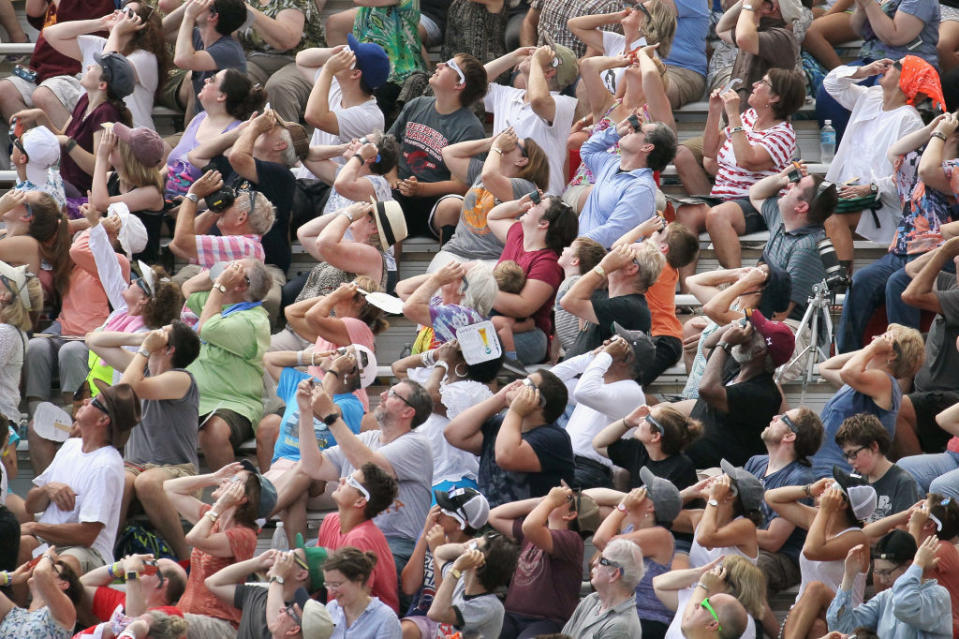
Southern Illinois Crossroads Eclipse Festival, Carbondale (1:59 p.m. CDT; 4 minutes, 9 seconds): a spectator event is planned for Saluki Stadium, as it was on August 21, 2017, during the "Great American Eclipse."
Eclipse on the Bricks Festival, Albion (2:01 p.m. CDT; 4 minutes, 6 seconds): close to the centerline in rural Illinois.
Bald Knob Cross of Peace, Alto Pass (4 minutes 8 seconds); about 700 people watched the 2017 eclipse from this, one of the highest points in the region.
Indiana
Eclipse & More 2024, Richmond (3:07 p.m. EDT, 3 minutes, 49 seconds): camping, zip lining, rock walls and food trucks on Wayne County Fairgrounds.
Knightstown Solar Eclipse 2024 (3:06 p.m. EDT; 4 minutes, 1 second): off the beaten track east of Indianapolis but on the centerline for a long totality.
The Dark Side of the Wabash, Vincennes (3:03 EDT, 4 minutes, 5 seconds): the longest totality in Indiana in a historic town with a four-day festival of science, arts and music events.
Ohio
Cuyahoga Valley National Park (1:58 p.m. EDT; 4 minutes, 9 seconds): one of only two U.S. National Parks in the path is home to the historic Ohio & Erie Canalway.
Armstrong Air & Space Museum, Wapakoneta (1:54 p.m. EDT; 3 minutes, 56 seconds): visit Neil Armstrong's hometown to see his Gemini 8 capsule and the eclipse.
Total Eclipse of the HeartLAND Party, Cleveland (3:15 p.m. EDT; 3 minutes, 50 seconds): experience totality at the Rock & Roll Hall of Fame on Lake Erie next to the Great Lakes Science Center.
Pennsylvania
Erie, Pennsylvania (3:16 p.m. EDT; 3 minutes, 43 seconds): easily accessible from Pittsburgh, but avoid Presque Isle, which will be extremely busy.
Lake Erie Speedway (3:15 p.m. EDT; 3 minutes, 50 seconds): a big public event is planned, which could help alleviate parking problems in Erie.
Lake City (3:15 p.m. EDT, 3 minutes, 42 seconds): just two seconds off the longest totality in Pennsylvania and away from potentially busy Erie.
New York
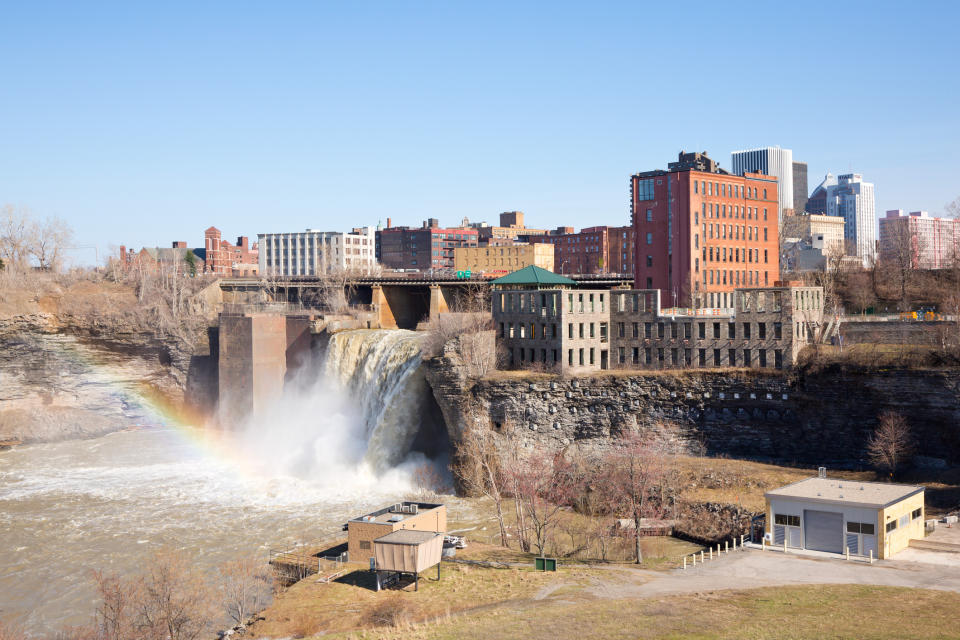
ROC The Eclipse at the Rochester Museum and Science Center, Rochester (3:20 p.m. EDT; 3 minutes, 39 seconds): a three-day festival with hands-on activities, speakers, music and food.
Niagara Falls State Park (3:18 p.m. EDT, 3 minutes, 29 seconds): for a shot of an eclipsed sun over Horseshoe Falls, you'll need to be at Terrapin Point on the U.S. side (and use a wide-angle lens).
Embrace the Dark, Geneva (3:21 EDT, 2 minutes, 20 seconds): three-day festival of wine tastings, astronomy art exhibits and lectures at the northern end of Seneca Lake, one of the Finger Lakes.
Vermont
St Albans City (3:26 p.m. EDT, 3 minutes and 15 seconds): easy to reach and the longest totality in Vermont.
The Whiteout, Jay Peak Resort (3:26 p.m. EDT, 3 minutes and 32 seconds): a Pink Floyd tribute band at the biggest ski resort in the path of totality.
Richford (3:26 p.m. EDT, 3 minutes and 31 seconds): this small Vermont/Canada border town could get busy.
New Hampshire
Colebrook (3:28 p.m. EDT, 3 minutes): the first place in New Hampshire to experience totality.
Pittsburg (3:28 p.m. EDT, 3 minutes and 14 seconds): close to Lake Francis State Park in the Great North Woods region.
Connecticut Lakes State Forest (3:28 p.m. EDT, 3 minutes and 26 seconds): as close as you can go to the centerline of the path of totality in New Hampshire.
Maine
Millinockeclipse, Millinocket (3:31 p.m. EDT, 2 minutes and 55 seconds): a fun race that begins at first contact and ends as totality ceases and daylight returns.
Katahdin Woods and Waters National Monument (3:31 p.m. EDT, 3 minutes and 20 seconds): see the eclipse above the highest mountain in Maine.
Houlton, Maine (3:32 p.m. EDT, 3 minutes and 20 seconds): the last place in the U.S. to experience totality until parts of Alaska in 2033.
Additional resources
For planning trips to see solar eclipses, the interactive Google Maps on Xavier Jubier's eclipse website is invaluable (and the source for the timings in this article), as are the simulations for the 2023 and 2024 solar eclipses on Eclipse 2024 and the beautiful eclipse maps on GreatAmericanEclipse.com. Climate and weather predictions by meteorologist Jay Anderson on Eclipsophile.com are equally instructive, as are ex-NASA eclipse calculator Fred Espenak's Eclipse Wise and Mr. Eclipse.
